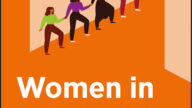Women in Leadership: Thirty five years on and still asking "Is it just me?”
Cathy Shimmin explores the changes in leadership for women over her career.
Thirty-five years ago, I entered the charity sector with a head full of ambition, a heart full of purpose, and—if memory serves—a metabolism that hadn’t yet declared war on me. Since then, I’ve gained wisdom, experience, and a few stress-induced reactions courtesy of menopause. Also, the Liverpool men’s team are now reigning champions of England again (though not the women’s team—yet).
As DSC marks over 50 years of impact, it got me thinking, what’s really changed for women in leadership across our sector?
What’s changed?
Let’s start with the good news. There’s been real progress:
Gender pay gap shrinking (Slowly): The UK gender pay gap for full-time employees fell to 7.0% in 2024, down from 7.5% the year before. That’s a quarter reduction over the past decade. Office for National Statistics’ Annual Survey of Hours and Earnings (ASHE)
Leadership representation rising: Women now hold 42% of board seats in large UK companies, and 31% of leadership roles overall. In sectors like healthcare and education, women dominate leadership—at 49% and 54% respectively. FTSE Women Leaders Review 2024
Charity infrastructure flip: Many of the sector’s key infrastructure bodies have gone from male-led to female-led. It’s not just tokenism—it’s a quiet revolution. McKinsey’s Women in the Workplace 2024
Flexible work (sort of): More women are working flexibly, especially mothers. They report less fatigue, more psychological safety, and fewer microaggressions. But flexibility doesn’t always mean fair pay or promotion prospects. Working Families and TUC reports
What hasn’t changed? (or feels very slow to change!)
Now for the part where I sigh deeply and reach for the biscuit tin.
Personal development courses: I deliver a lot of these and guess what? Confidence, assertiveness, time management—still overwhelmingly attended by women. Back in the day we renamed “Assertiveness for Women” to “Assertiveness for All” in the spirit of equality. Guess what? Still 90% women. Is it seniority? Social conditioning? Or just that men think they’re already assertive, confident and workload effective enough?
Promotion gaps: For every 100 men promoted to management, only 87 women are. For women of colour, the numbers are even lower. Again, my Moving into Management classes are attended predominantly by women. (note to self – seek out the stats on what that looks like at CEO level training!!!)
Flexible work penalties: 97% of women believe asking for flexible work could harm their promotion chances. And 95% say their workload isn’t adjusted when they do work flexibly. So yes, we’re bending—but often without support.
Imposter syndrome: 54% of women say they’ve experienced it, compared to 38% of men. It’s especially common among younger women and those with higher education. And 72% say it’s held them back at work. https://www.independent.co.uk/life-style/women-imposter-syndrome-workplace-confidence-b2313770.html
What’s emerging?
Despite the challenges, there is hope. Dedicated women’s leadership spaces are growing. More women are speaking openly about their experiences, mentoring others, and challenging the “just me?” feeling that so-called imposter syndrome thrives on.
And that’s why we’re hosting the Women in Leadership Conference—a space for charity CEOs and senior leaders to connect, reflect, and recharge. Come and hear the brilliant Debra Allcock Tyler explain why “we are not impostors, we are change makers.” Expect stories, tips, and guidance from women with vast and very valid experience in the sector. And come away knowing, it’s not ‘just me’. We all face mighty challenges – and we all have mighty strengths to meet them head on. Register here today.
We’ve come a long way. We’ve got further to go. But if there’s one thing I’ve learned in 30 years, it’s that women in this sector don’t just survive—they lead, they innovate, and they change the game. Even if they occasionally do it while juggling childcare, spreadsheets, and existential dread.



